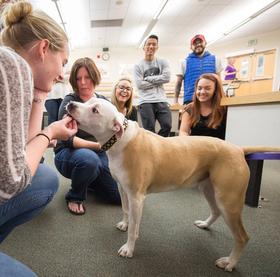Some of the hottest jobs of the future may be in the nanotechnology industry. For community college students who dream big, the key to a bright future may be thinking small – very small.
The National Nanotechnology Initiative defines nanotechnology as “the understanding and control of matter at dimensions between approximately 1 and 100 nanometers where unique phenomena enable novel applications.” A nanometer is one-billionth of a meter. According to the NNI, nanotechnology involves “imaging, measuring, modeling, and manipulating matter” at these tiny scales.
Students who earn associate’s degrees in nanotechnology are prepared to work in research, production, marketing, and business environments where knowledge of nanoscience is needed.
The Nanotechnology Job Market
Nanotechnicians work in various fields, including biomedicine, biotechnology, agriculture production, and environmental analysis. . The website for Minnesota State Community College and Technical College’s Nanotechnology program quotes Jack Uldrich and Deb Newberry, the authors of the book The Next Big Thing Is Small. According to these experts, “The market for nanotechnology in the United States was rapidly growing and projected to reach $1 trillion by 2010. Growth over this period is expected to produce between 800,000 and two million new technical jobs.”
The National Nanotechnology Initiative reports that in the United States, federal funding for nanotechnology has increased “from approximately $464 million in 2001 to nearly $1.5 billion for the 2009 fiscal year.”
This video explains what nanotechnology is.
New Nanotechnology Program for Community College Students in Virginia
Thanks to the college's recently launched nanotechnology education program, students at Virginia’s Danville Community College can now take advantage of a new program that will prepare them to work in up-and-coming nanotechnology industries. The first class, “Introduction to Nanomaterials and Processes,” discusses a matter on an atomic and molecular scale, teaches them to use tools like the atomic force microscope, and makes connections between nanotechnology and other fields of science and technology.
Beverly Clark III, the director of the nanotechnology education program at DCC, tells the local Danville News that students do not need a strong background in math or science to succeed in the course. Students who find they enjoy working with nanomaterials and processes can go on to earn an associate’s degree in applied science. Such a degree prepares students to enter the workforce as lab technicians or technical scientists, or they can eventually use their credits to earn a four-year degree.
Clark notes that students who earn an associate’s degree from a nanotechnology program will be prepared to work in any field involving precision equipment.
This video explains what a career in nanotechnology entails.
Other Community College Programs
Danville Community College is one of only a few community colleges offering nanotechnology education programs. The U.S. Department of Labor and Department of Education’s “Career Voyages” website lists four other community colleges offering nanotechnology education opportunities. In addition to Danville Community College, these include:
- Minnesota’s Dakota County Technical College – Dakota County Technical College offers a well-defined two-year associate’s degree program in Nanoscience Technology. The program requires students to take courses in college physics, biology, general chemistry, statistics, and college algebra during their first two semesters, in addition to a two-course sequence in the fundamentals of nanoscience. Further on in the program, students take courses in nanoelectronics, nanobiotechnology, and manufacturing quality assurance. Students also have the opportunity to complete an internship.
- Minnesota State Community College and Technical College offers a two-year associate’s degree in Nanoscience Technology. The popular program includes courses in the “Fundamentals of Nanoscience,” “Nanobiotechnology and Nanomedicine,” “Laboratory Instrumentation,” and “Semiconductor Fabrication.” The program also offers students the chance to earn course credit towards the associate’s degree by interning in a nanotechnology-related industry.
- North Dakota State College – At North Dakota State College, whose nanotechnology program debuted in 2006, students can earn an associate’s degree in Nanoscience Technology. The course sequence includes courses in physics, chemistry, biology, statistics, and fundamentals of nanoscience. The program is also unique in requiring that students take a course on the “Social and Ethical Implications of Technology.”
This video describes the program at Oakton Community College.
Why Choose Nanotechnology?
The nanotechnology field has much appeal as a possible career. In addition to the prospect of rapid industry growth and concomitant job opportunities, the nanotechnology field is poised to become involved with some of today’s most pressing global issues.
Nanotechnology has potential applications for developing cheap and clean energy sources, meeting global needs for clean water through inexpensive water filtration, reducing pollution, detecting cancer and Alzheimer’s diseases, and building faster and better computers.
Students interested in the lucrative and expanding nanotechnology industry should keep their eyes open for a new nanotechnology program coming soon to a community college near them.
Questions? Contact us on Facebook. @communitycollegereview















